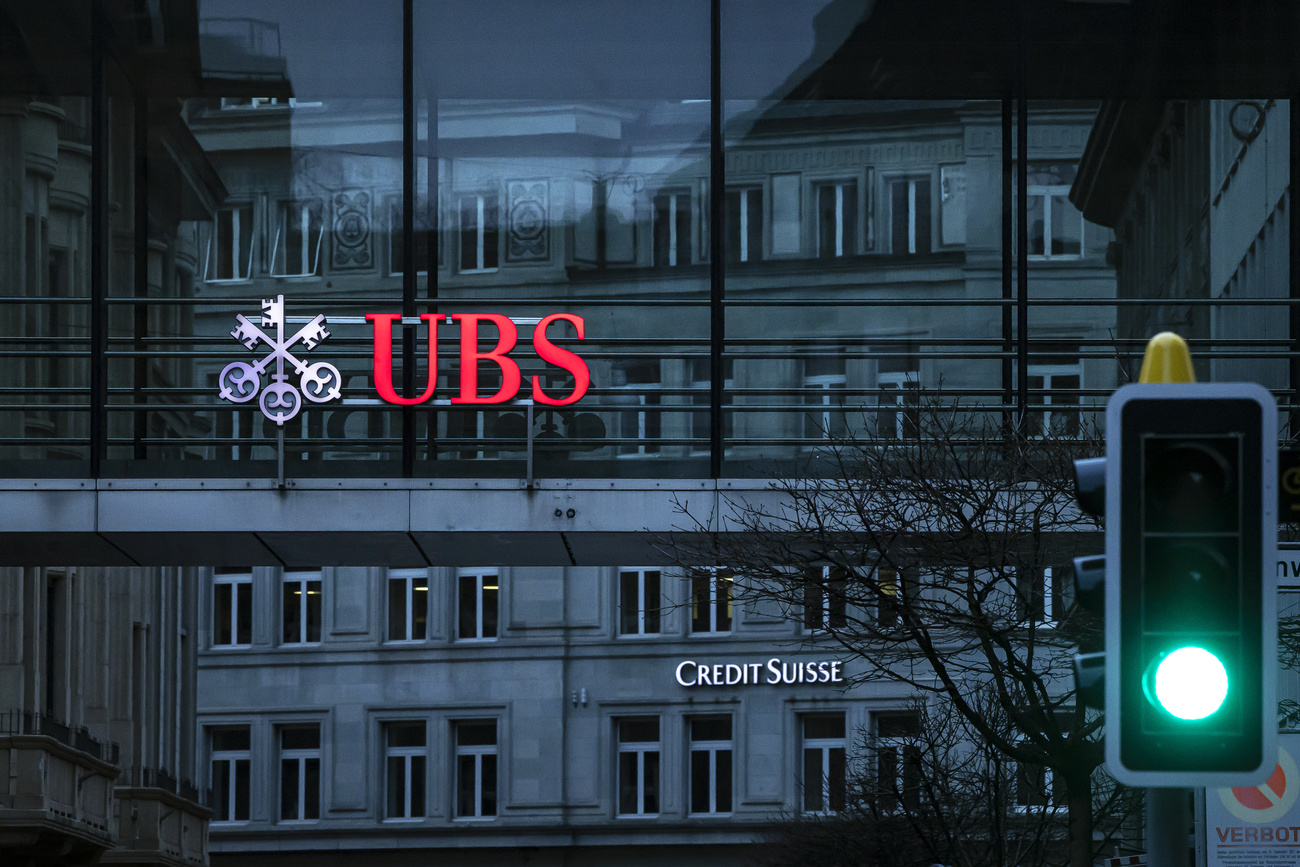
Credit Suisse’s imminent collapse was ‘an open secret’

Lukas Hässig, the man behind the popular Swiss financial blog Inside Paradeplatz, has long been a thorn in the side of Credit Suisse and other Swiss banks. In an interview, he talks about the lawsuit Credit Suisse filed against him, freedom of expression and the Swiss media, and the collapse of Switzerland’s second-biggest bank.
In December 2022, Credit Suisse sued Inside Paradeplatz, demanding that 52 of its articles be taken down and CHF300,000 ($327,000) in damages from its publisher, journalist Lukas Hässig.
Since then, there has been a major twist in this David-versus-Goliath story: Goliath dramatically collapsed on March 19 and was taken over by its rival UBS. Who is to blame? Did the media help bring down Switzerland’s second-biggest bank?
Gotham City: Three months ago, Credit Suisse suedExternal link you over 52 articles – all those on your site which mentioned its name. The bank also wanted 200 reader comments deleted and the removal of an interviewExternal link with economics professor Hans Geiger. This kind of major legal offensive against a media organisation isn’t very common in Switzerland. Why do you think Credit Suisse reacted like that?
Lukas Hässig: They said it was to protect their employees, but behind it was a desire to put a stop to my blog. I have my sources of information, and I hear things from readers too. By having a go at me, they were hoping to reduce those sources to silence.
G.C.: Credit Suisse didn’t like the reader comments on the site. What were these comments about?
L.H.: Some labelled the bank a “Titanic”, which turned out to be quite right. Some described the top management as idiots, which of course wasn’t a very nice thing to say.

More
Credit Suisse launches lawsuit against Zurich finance blog
G.C.: That would be what everybody’s saying about them now, though, wouldn’t it?
L.H.: To post all these comments on the site is quite an undertaking, and it means a lot of responsibility. It takes lot of work. At present, I’ve got 1,400 comments waiting to be uploaded, and I have to read them all. But I think the effort is worthwhile, to give my readers this possibility of free expression.
G.C.: But you can be wrong, too.
L.H.: For sure. There are limits to freedom of expression. That’s why I need to read them all. I do my best, but I may make mistakes. If that happens, by all means call me or send me an e-mail to say such-and-such a comment should be deleted. And I do that if the comments are over the top. But that [lawsuit] was something at a different level. They wanted to destroy a publication that had become well-known in its field because it provided significant information.
Started by investigative journalists Marie Maurisse and François Pilet, Gotham City is a newsletter that monitors judicial decisions, especially in relation to white-collar crime.
Each week, it reports on cases of fraud, corruption and money laundering involving the Swiss financial markets, based on public court documents.
Every month, Gotham City chooses one of its articles, expands it and makes it available to readers of SWI swissinfo.ch.
G.C.: In hindsight, would you say the legal attack by Credit Suisse stemmed from a sense of panic?
L.H.: No, it was just stupidity and arrogance. Over the past eleven years, I have had to deal with occasional lawsuits about things I said on my blog. But in bringing criminal charges as well as a civil suit, Credit Suisse went much further. In my view, they crossed a red line.
G.C.: You mean it was more legitimate to sue a one-man media outlet for CHF300,000?
L.H.: That’s their option. They have a business; I have a business. It’s big business against a small business, but judges tend not to be stupid. They see that too. Usually they don’t want to destroy a small media outlet. On the other hand, bringing criminal defamation charges was a very dangerous thing to do, very hostile, and I thought not very Swiss. They got a public prosecutor to go after a journalist who was criticising them and after the readers who wrote comments expressing their anger about the bank. Since the lawsuit was filed, the prosecutor has been doing all he can to find out who the critics were. That’s not the kind of country we want to have here.

More
Swiss banking secrecy law clashes with freedom of speech
G.C.: Do you think they were really just going after the negative reader comments, or were they trying to cut off the flow of information from your sources?
L.H.: Credit Suisse executives were usually making ten million [Swiss francs] a year. These are high-flying business types. They don’t have time to read crappy comments on a blog. No, what they were after was to cut off my sources. And there they got help from a public prosecutor.
G.C.: Now Credit Suisse is in the role of the victim. There is disapproval being expressed about social media, and about the English-speaking media ganging up on them.
L.H.: We don’t know enough yet. What we’re seeing in my view is a pretty inept government. We were completely unprepared. This is really strange after all that has gone on.

More
How the Swiss ‘trinity’ forced UBS to save Credit Suisse
G.C.: The Financial Times and Bloomberg had reporters covering the secret negotiations going on last weekend in Zurich. The Swiss media were completely blindsided. How do you explain that?
L.H.: That’s one of the reasons why many people here in Switzerland have been saying they were ganging up [on Credit Suisse]. But the truth of the matter is that even last October, it was abundantly clear that here was a bank in big trouble. It was an open secret that something was going to give, just no-one could say when. It’s not a good thing to be the sick man [of the banking world] when a hurricane is approaching.
G.C.: Maybe these [foreign] media just realised the seriousness of the situation sooner, while Switzerland and its government agencies just played a wait-and-see game?
L.H.: Quite right. When a media outlet shows that it has grasped the situation, it gets information in return. Aside from that, were they sometimes being directed? Maybe. And the Swiss media? Maybe too. Take the Neue Zürcher Zeitung. I love that paper. In fact I read it every day. Look at the tough line they are taking now. But were they critical enough before? No, they should have been. They know English. The Financial Times is a major outlet. It always has been for the Swiss financial market. So there’s no excuse. But that’s Switzerland. There is always a tendency to shield the powerful, until everything falls to pieces.
G.C.: On March 20 we woke up with the ultimate mega-bank [after UBS took over Credit Suisse]. What will be the consequences?
L.H.: We were in this situation once before with a pair of banks that were “too big to fail”. Years have gone by since the collapse of Lehman Brothers and near-collapse of UBS, and one would have thought that if this happened again, a solution would be forthcoming. But since Sunday we know we were all wrong. We were wrong to think that a bank could just be wound up. Maybe that could be done with a Raiffeisen bank in canton Thurgau or the such like. Maybe it just can’t be done.
Some people are saying that Credit Suisse should have been temporarily nationalised – not in Switzerland. Britain did it, Germany did it; not us. We are a decentralised, federalist country. We are a small country with limited resources, be they intellectual or commercial. The government is weak. It wants to look strong, with emergency legislation and that sort of thing. But it’s only window-dressing, as we can now plainly see.
The Swiss financial regulator FINMA was useless in this case, which is no surprise. Only the executive arm can deal with such powerful interests. The federal government needs to get stronger. What we’re dealing with here is a political crisis. The situation we saw over the past few days showed we are just not up to it. If the Americans can call us up and tell us what to do, it’s a bad show. We need to become stronger politically.
G.C.: What about the media? Will they be able to do their job dealing with a juggernaut like this?
L.H.: I hope so. At least the media remain competitive. And if the major media outlets aren’t up to it, there are always a few small ones. The problem is that they can be easily crushed.
G.C.: Will UBS one day bring charges against a small Swiss media outlet?
L.H.: I prefer not to think about it.
G.C.: How did Inside Paradeplatz readers react this week?
L.H.: It’s a totally new situation for me, because a lot of people seem to think I played a role in the fall of Credit Suisse. They regard me as a destroyer. I knew some people were thinking that, but not to this extent. I take that seriously. Of course I don’t agree with it myself; I would claim the opposite is the case. I tried to warn people again and again. Maybe everything I wrote wasn’t great. But overall, I was just trying to say we’ve got a big problem here.
When the Credit Suisse executives brought criminal charges against me and the authors of comments, they thought it was what they needed to do. The Zurich public prosecutor thought so too. They thought, ‘This blog is ruining us, it’s going to cost us our jobs’. But how did they get to that stage? The reality is that it was Credit Suisse that self-destructed. This happened because the leadership failed to appreciate what was really going on. I think it was partly a question of the culture. What is our problem in Switzerland? Why can’t we take criticism, even if it is a bit blunt? Do we really want to have just one opinion on things? Do we always have to be nice and say everything is fine? You can see that that just won’t work, because there’s a whole world out there, and stuff happens.

More
Credit Suisse agrees to CHF3bn takeover by rival Swiss bank UBS

In compliance with the JTI standards
More: SWI swissinfo.ch certified by the Journalism Trust Initiative




























You can find an overview of ongoing debates with our journalists here . Please join us!
If you want to start a conversation about a topic raised in this article or want to report factual errors, email us at english@swissinfo.ch.